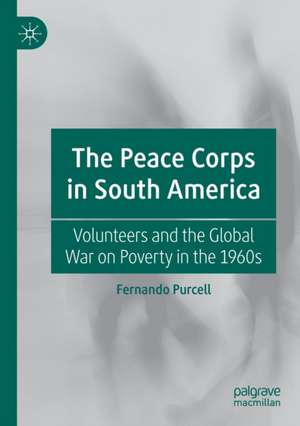The Peace Corps in South America: Volunteers and the Global War on Poverty in the 1960s
Autor Fernando Purcellen Limba Engleză Paperback – 9 sep 2020
| Toate formatele și edițiile | Preț | Express |
|---|---|---|
| Paperback (1) | 380.45 lei 6-8 săpt. | |
| Springer International Publishing – 9 sep 2020 | 380.45 lei 6-8 săpt. | |
| Hardback (1) | 498.14 lei 6-8 săpt. | |
| Springer International Publishing – 9 sep 2019 | 498.14 lei 6-8 săpt. |
Preț: 380.45 lei
Nou
Puncte Express: 571
Preț estimativ în valută:
72.82€ • 79.13$ • 61.21£
72.82€ • 79.13$ • 61.21£
Carte tipărită la comandă
Livrare economică 21 aprilie-05 mai
Preluare comenzi: 021 569.72.76
Specificații
ISBN-13: 9783030248109
ISBN-10: 3030248100
Pagini: 180
Ilustrații: XI, 180 p. 7 illus.
Dimensiuni: 148 x 210 x 10 mm
Greutate: 0.24 kg
Ediția:1st ed. 2019
Editura: Springer International Publishing
Colecția Palgrave Macmillan
Locul publicării:Cham, Switzerland
ISBN-10: 3030248100
Pagini: 180
Ilustrații: XI, 180 p. 7 illus.
Dimensiuni: 148 x 210 x 10 mm
Greutate: 0.24 kg
Ediția:1st ed. 2019
Editura: Springer International Publishing
Colecția Palgrave Macmillan
Locul publicării:Cham, Switzerland
Cuprins
1. Introduction: Peace Corp Volunteers as Intermediary Agents in the Global War on Poverty.- 2. Learning to Learn: Community-Development Training during the 1960s.- 3. Confront Poverty Beforehand.- 4. South America's Fertile but Different World.- 5. Difficulties and Frustrations on the Ground.- 6. Volunteers in the Middle of Cold War Ideological Struggles.- 7. Epilogue: De-centering Cold War Narratives Using Peace Corp Volunteer´s Accounts.
Notă biografică
Fernando Purcell is Professor of History at the Pontificia Universidad Católica de Chile. He earned his PhD from the University of California, Davis, USA, and is the author of several books on US-Latin American relations.
Textul de pe ultima copertă
In the 1960s, twenty-thousand young Americans landed in South America to serve as Peace Corps volunteers. The program was hailed by President John F. Kennedy and by volunteers themselves as an exceptional initiative to end global poverty. In practice, it was another front for fighting the Cold War and promoting American interests in the Global South. This book examines how this ideological project played out on the ground as volunteers encountered a range of local actors and agencies engaged in anti-poverty efforts of their own. As they negotiated the complexities of community intervention, these volunteers faced conflicts and frustrations, struggled to adapt, and gradually transformed the Peace Corps of the 1960s into a truly global, decentralized institution. Drawing on letters, diaries, reports, and newsletters created by volunteers themselves, Fernando Purcell shows how their experiences offer an invaluable perspective on local manifestations of the global Cold War.
Caracteristici
Offers a new perspective on how the global Cold War impacted local communities in South America Focuses on how local actors and agencies shaped the experiences of Peace Corps volunteers, and in turn the Peace Corps itself, its training strategies, and its relationships with foreign institutions worldwide Examines Peace Corps volunteers as intermediaries, rather than unidirectional agents of American influence
